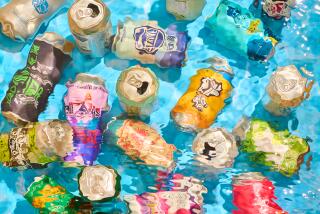Brewers Sense Root Beer War Ahead : Markets: Sale of Barq’s to Coca-Cola gives each of Big Three at least one brand. And regional firms expand to meet demand for frothy concoction.
- Share via
PORTLAND, Ore. — In a land where cola is king, root beer has been written off as second-rate suds for kids or a sugary recipe best left to home brewers with a nagging sweet tooth.
*
The deep, dark, frothy soda is an original American drink concocted at least a century before colas were invented, yet it commands just a tiny fraction of the national soft drink market, even with famous brand names like A&W;, Barq’s, Dad’s, Hires and Mug.
But the recent Coca-Cola Co. purchase of the privately held Barq’s label may escalate the battle of what are now the “Big Three” root beer bottlers--Coke, Pepsi and Cadbury Schweppes.
It also means stiffer competition for the dozens of smaller regional and local root beer brewers trying to establish a market.
“We’re so small we can’t afford an advertising budget,” said Jack Joyce, co-founder of Rogue Ales, a micro-brewery based in Newport that offers soft drinks in addition to beer.
The Oregon Coast Aquarium asked Joyce to brew root beer to make floats that symbolize the black-and-white coloring of Keiko, the killer whale of “Free Willy” movie fame who is moving to the aquarium this year.
“That’s how it got started,” said Joyce, a lawyer and former Nike Inc. marketing executive. “There are a lot of good products out there, and unless you’ve got something special, it’s hard to get it moving.”
Gimmicks have helped create other regional root beer labels, including a Minneapolis brand created by Ken Killebrew, son of baseball Hall of Famer Harmon Killebrew.
The younger Killebrew, who crafted the drink from his dad’s basement recipe, calls it, appropriately enough, “Killebrew.”
“I thought it was just going to be a small regional thing,” Killebrew said. “But I’m literally getting requests from all over the country, all over the world.”
His father’s home brew carried on a tradition that began in 18th-Century Midwest farmhouses and took off commercially after Charles Hires introduced the drink made from his mix of roots, herbs and berries at the 1876 Philadelphia World’s Fair.
Hundreds of labels have appeared and disappeared since then, with some of the best-known survivors ending up the property of the Big Three industry titans.
Coca-Cola now owns Barq’s, the No. 2-selling root beer brand after A&W;, which is owned by Cadbury Schweppes of Britain. Mug root beer, owned by Pepsi-Cola, is third, and the Hires label, also owned by Cadbury Schweppes, is No. 4, according to John Sicher, co-publisher of Beverage Digest, an industry newsletter in Greenwich, Conn.
But Sicher says that even the combined sales of those top four labels help root beer command only about 3% of a $51 billion annual soft drink market. “They really fall under the radar screen as far as we’re concerned,” he said.
Regional brewers say they have found success by focusing on flavor that the major brands cannot duplicate.
“These big companies don’t have any personality left,” said Randy Sprecher, founder and owner of Sprecher Brewing Co. in Glendale, Wis.
Sprecher, who learned his craft brewing beer, says the only root beer worth drinking must be freshly brewed with natural ingredients, such as honey and raw vanilla, like his recipe and the root beer made by his regional competitor, Killebrew.
“I went through 13 months of making sample after sample, and testing people,” said Killebrew, who has expanded to eight states since he began selling root beer in 1993.
Laura Bracken-Clough founded the Thomas Kemper Soda Co. in Seattle with her sister, Carol Bracken-Clemency, on the strength of a root beer recipe tested on a whim at a Washington beer festival by Rande Reed, a brew master who once worked for Sprecher.
Parents who treated their children to the root beer found they liked the fresh draft taste themselves, and the soda company was spun off from the Thomas Kemper micro-brewery to cater to what the sisters hoped would be a growing taste for an upscale family drink.
“There’s a lot of nostalgia with root beer,” Bracken-Clough said. “I can’t tell you the events where I’ve gone and people say ‘This reminds me of my grandfather.’ ”
The Big Three likely will rely on brute economic force in their battle for the root beer market.
Brad Shaw, a Pepsi spokesman, predicted more national television advertising for root beer brands.
Coke’s purchase of Barq’s, which had become known for its outrageous self-promotion in print ads, likely will not change its marketing focus on whimsy and attention-getting devices, such as its “Soviet Union Going Out of Business Sale” in 1992.
Some regional root beer brewers, including Sprecher, already expect the worst.
“They throw money around like crazy,” the Wisconsin brewer said, adding that his retail customers have told him about “bounties” paid to cut back shelf space.
More to Read
Eat your way across L.A.
Get our weekly Tasting Notes newsletter for reviews, news and more.
You may occasionally receive promotional content from the Los Angeles Times.










